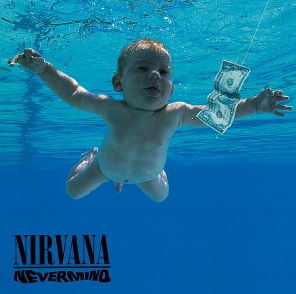Here’s a list of some of the words I see when editing authors’ books that have been written as one compound word and shouldn’t have been, and two words that should have been compounded into one.

Nirvana – Nevermind album cover
Nevermind/Never mind
There’s a whole bunch of people, maybe thousands or even millions, who grew up with Nirvana’s “Nevermind” album, mostly in their late thirties to early fifties, who think this is one word, meaning, “don’t worry about it.” In fact, “nevermind” as one word is actually a noun.
It seems to uniquely feature in the old-fashioned Southern idiom, “don’t pay me no nevermind,” to mean, “don’t mind me.” Given Kurt Cobain, the lead singer of Nirvana was a big fan of Lead Belly,a blues artist also from the South, he may have picked up on this way of phrasing and used it for the album title, but who knows? Maybe Cobain just couldn’t spell, or it was just a gimmick.
Anymore/Any more
“Anymore” is a word in US English, but not in UK English. There is also a different meaning when written as two words, “any more.”
You can’t go bowling anymore. You don’t have any more days spare to attend.
“Anymore” is an adverb when it means a time-related deficit only – you have no more time to go bowling. The fact you don’t have any more money means you have a deficit of something that is not time.
Anyway/Any way
Again, “anyway” written as one word has a different meaning to writing it as two, “any way.”
You couldn’t go to the concert anyway. There isn’t any way of going.
“Anyway” means “despite something already stated” and is an adverb. “Any way” is the same as “any method.” The word “way” is the noun, and “any” is the pronoun.

So are you literally moving onto your dessert?
Onto/On to
“Onto” should only be one word when you are talking about an animal, object, or person being moved, or moving “onto” the surface of something. “We moved the vase onto the table so it wouldn’t get broken.”
When you write “on to” this means something, such as time or an event has progressed, ” We moved on to the dessert at the dinner.” You are “moving on” to the next meal, not climbing upon it.
Into/In to
If you are throwing something “into the trash can” then use “into” as a word to mean the trajectory of an object, person, or animal to the inside of a hole, opening, chasm, or pool of water: “He dived into the pool,” or “She put it into her pocket.”
If you are “breaking in to the house” then this means you are “breaking in” to the house, or if you are “walking in to the sound of laughter”, you are walking in, only to find the sound of laughter emanating.
Someplace/Some place
“Someplace” sounds like American-ese when used in UK English. It’s a purely colloquial phrase, and should be written as two words only, as it is yet to be an official word (it is not the same as “someday,” which has been inaugurated into dictionaries at least in US English):
“Some place else” is correct, whereas, “Someplace else” immediately looks like the voice of an American character or narrator in a novel, as it is not a correct compound word usage.
Everyday/Every day
If you are an “everyday” kind of guy, then you are a regular, ordinary person. But if you go to the mall every day, this means each day you visit the store.
Maybe you are a great dancer, but it may be that your friends are lying to you about your prowess.
Maybe means “perhaps,” where if something may be, it might be so. If you are not sure, “Maybe” can start a thought or question, as it is an adverb, whereas “May be” cannot truly start a sentence because in the two-word sense, as it is a verb phrase.
Here’s a clip of Tom Cruise dancing as Les Grossman in the movie “Tropic Thunder,” just for kicks. Maybe he’s good, maybe he’s bad. No doubt it may be he’s down with the kids.
Alright/All Right
The jury is kind of out on this one for me personally. While the super-correct format is “all right,” an an English editor I am fine with “alright” in colloquial writing, such as dialogue, but if you want to be absolutely US English-correct, probably all your instances should be spelled as two words, “all right.”

Bags packed, all ready to go.
Unlike “alright,” these two have different meanings.
Your bags are all ready to go, and the taxi is already here.
“Already” is purely related to time, and denotes something that happened and is now over or is still happening.
“All ready” can easily be figured out in your writing. If you can say ” The bags are ready to go” without the “all,” then you know for sure you shouldn’t use “already.” If the sentence relates to something happening and is over or happening now, use “already.”
Get an Editorial Review | Get Amazon Sales & Reviews | Get Edited | Get Beta Readers | Enter the SPR Book Awards | Other Marketing Services






















Leave A Comment